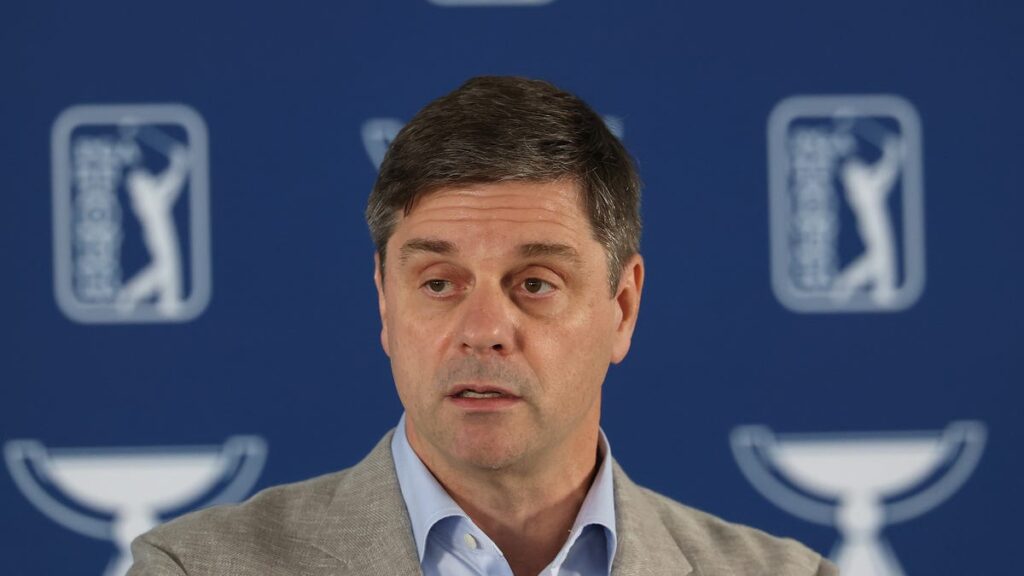As the owner of more than 180 patents, inventor and businessman Charles Kettering knew of what he spoke when he said the best way to kill an idea is to get a committee working on it. Yet collective panels often serve a purpose for those who convene them, as evidenced by the Central Committee of the Chinese Communist Party, which exists to provide air cover for what a powerful chief executive has already decided will happen. The CCP has 205 members, and 204 of those votes don’t outweigh the one of Xi Jinping.
On Wednesday, the PGA Tour’s new CEO, Brian Rolapp, announced the creation of the Future Competition Committee, which is charged with aggressively re-examining the Tour’s entire business model. It could be airily dismissed as a talking shop, an exercise in keeping minutes while losing months, but Rolapp’s star chamber has the potential to author — or at least sign off on — the most seismic shake-up in the organization’s history.
Not a bad tease for 24 days in the job.
In some respects, Rolapp will have less executive authority at the Tour than existed in his past gig. The veteran NFL executive spent over 20 years in a sport with one authority, with players who are contracted, where fans and broadcasters know who’s playing each week, and where his outfit owned the biggest event. Now he’s in a sport with multiple bodies running things, with talent that isn’t contracted, in which fans and broadcasters have no guarantee who will play, and where — despite being arguably the most influential entity in golf — he controls none of the game’s five biggest events.
Tackling that inequity head-on is a fool’s errand. Players will not consent to being contracted, and even armed with a billion-five from Strategic Sports Group, he’d struggle to acquire the PGA Championship or Ryder Cup, given how many PGA of America snouts would need to be dislodged from the trough. So other than creaming off a percentage of the revenue generated by the majors — and make no mistake, the Tour is coming for its share of that — the best he can do is streamline and elevate his own product.
What does that look like?
In both public comments and meetings with staff, Rolapp has said that every successful sports league requires three things, and that the PGA Tour currently only has one of them. That’s competitive parity, notwithstanding Scottie Scheffler performing on a different plane than his contemporaries. The two elements he believes are lacking are simplicity and scarcity.
The Tour doesn’t have simplicity in any realm. Not in the structure of its season-long points race, not in the format of its playoffs, not in the eligibility criteria for issuing cards and filling fields. Until a change was announced in May, there wasn’t even simplicity in the scoring system for the Tour Championship finale. This muddied administrative system is the product of decades of compromises and sops to the membership and other constituents. Flicking away that scab will be painful for many.
The most crucial of Rolapp’s philosophical pillars is scarcity. The Tour’s 2026 regular season schedule has 38 stops, not including the Fall tournaments, and features four weeks when two events are staged concurrently. That’s closer to saturation than scarcity. Rolapp’s committee is a mechanism to right-size a product that has long been based (and its executives bonused) on one criteria — creating playing opportunities for members. In short, the Tour incentivized its leaders to dilute the product for parochial interests.
“I don’t think we have a particular number in mind,” the CEO replied when asked about reducing the number of events. “That’s an important part of the work that we’ll work with the committee on. I think the focus will be, as I mentioned, to create events that really matter.”
“Events that really matter” is the type of outwardly anodyne phrasing that will chill the blood of tournament directors and sponsors who already fear their tournament doesn’t really matter.
Even if Rolapp isn’t saying it aloud, his goal is obvious: to dispense with operating principles more befitting a trade association than an elite league. Midwifing that process won’t be easy as various stakeholders see their privileges and fiefdoms endangered. Like top players, who will be asked to give more to their business than signing a scorecard and posing for selfies. Like rank-and-file members, who will have to fight harder for less. Or tournaments and sponsors deemed surplus to requirements. And employees at the Tour’s GloHo, who will no longer be aligned to business priorities.
That’s a lot of potentially aggrieved constituents, but Rolapp knows he’ll never be more powerful than he is now, that those who hired him are forced to back him or risk looking like a bush league backwater ill-equipped for the modern sports economy. He’s clearly intent on being a radical change agent, and the vehicle for that change is the Future Competition Committee. It’s an exercise in consensus building, sure, and a potential incubator of ideas to improve the product, but really a means to ensure no one can complain about not being heard. But even powerful factions will find out that being heard no longer means being indulged.
The players who wrestled control of the PGA Tour in recent years are about to learn that they sunsetted a commissioner who was of the golf ecosystem and was historically answerable to them, for a modern, aggressive CEO who isn’t and, well, isn’t.
Read the full article here


